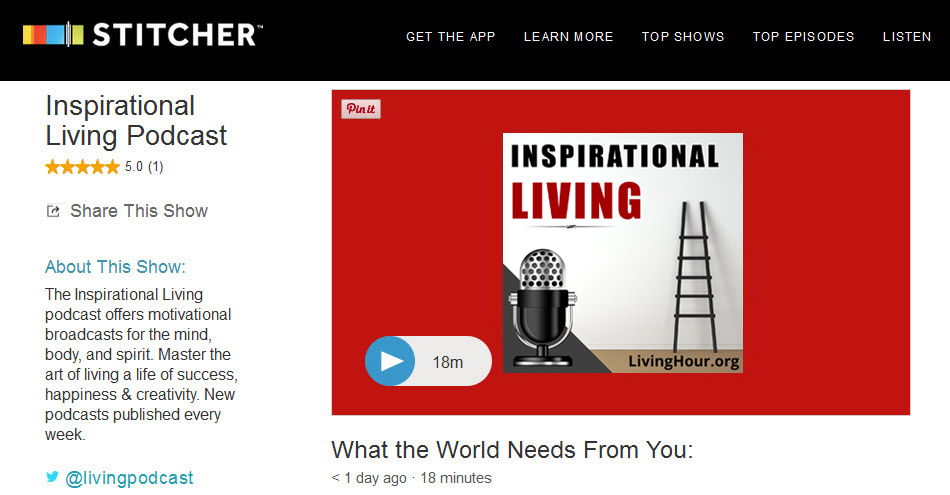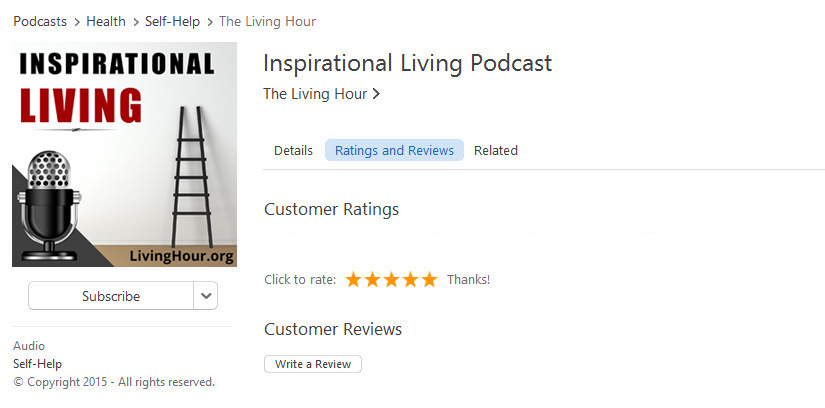06 May The Inspiration of Possibility | Motivational Podcasts
Podcast Transcript: Welcome to the Inspirational Living podcast, brought to you in part by Book of Zen, makers of inspirational fashion and gift ideas. Visit them online at BookofZen.com. Today’s podcast has been edited and adapted from The Power of Purpose by William George Jordan, published in 1910.
Some people like to wander in the cemetery of their past errors, to reread the old epitaphs and spend hours in mourning over the grave of a wrong. This new mistake does not antidote the old one. The remorse that paralyzes hope, corrodes purpose, and deadens energy is not moral health; it is an indigestion of the soul that cannot assimilate an act.
It is a selfish, cowardly surrender to the dominance of the past. It is lost motion in morals; it does no good to the individual, to the injured, to others, or to the world. If the past be unworthy, live it down; if it be worthy, live up to it and — surpass it.
Omnipotence cannot change the past, so why should WE try? Our duty is to compel that past to vitalize our future with new courage and purpose, making it a larger, greater future than would have been possible without the past that has so grieved us. If we can get real, fine dividends from our mistakes, they prove themselves not losses but — wise investments. They seem like old shares of stock, laid aside in the lavender of memory of our optimism and now, by some sudden change in the market of speculation, prove to be of real value.
Realizing mistakes is good; acting on them is better. When a captain finds his vessel is out of the right channel, carried by negligence, by adverse winds, or by blundering through a fog from the true course, he wastes no time in bemoaning his mistake, but at the first sunburst takes new bearings, changes his course, steers bravely towards his harbor with renewed courage to make up the time he has lost.
A mistake means increased care and greater speed. Musing over the dreams of youth, the golden hopes that have not blossomed into deeds, is a dangerous mental dissipation. In very small doses it may stimulate; in large ones, it weakens effort. It overemphasizes the past at the expense of the present; it adds weights, not wings, to purpose. “It might have been” is the lullaby of regret with which we often put to sleep the mighty courage and confidence that should inspire us.
We do not need narcotics in life, so much as we need tonics. We may try sometimes, sadly and speculatively, to reconstruct our life from some date in the past when we might have taken a different course. We go back in memory to some fork of the road in life, and think what would have happened and how wondrously better it would have been had we taken the other turning of the road.
We say to ourselves, “If I had only married the other one”; “If I had only taken a different major in college”; “If I had only spent certain money in some other way” — and so we run uselessly our empty train of thought over these slippery and dead “ifs”.
Even if these courses might have been wiser (and we don’t really know if they would have been), it is now as impossible to change back to them, as for the human race to go back to the Garden of Eden. The past does not belong to us to change or to modify; it is only the golden present that is ours to make as we would wish.
The present is raw material, the past is finished product — finished forever for good or ill. No regret will ever enable us to relive it. The other road always looks attractive; distant sails are always white; far-off hills always green. It may perhaps have been the poorer road after all, could our imagination, through some magic, see with perfect vision the finality of its possibility.
The other road might have meant wealth but less happiness. Fame might have charmed our ears with the sweet music of praise, but the little hand of love that rests so trustingly in ours might have been denied us. Death itself might have come earlier to us or his touch stilled the beatings of a heart we hold dearer than our own. What the other road might have meant, no eternity of conjecture can ever reveal, no omnipotence can enable us now to walk therein, even if we wished.
The full podcast transcript for this episode is now exclusively available to our patrons. Become our patron for as little as 3$ a month to gain access to all of our podcast transcripts and the exclusive series Our Sunday Talks. Learn more at: https://www.patreon.com/inspirationalpodcasts.
Subscribe to the Inspirational Living Podcast at iTunes & Stitcher
All transcripts from our inspirational podcasts are edited adaptations of the original work and copyrighted by LivingHour.org. For reproduction permission please contact us via our contact page.


